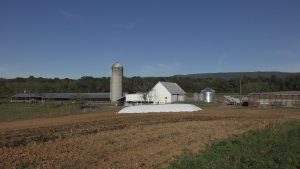I was in a good mood when I went to this morning’s interview. I was a little nervous, the kind of low-grade stage fright that comes with any kind of public event, but it was a good day. I got off Interstate 81 in Woodstock just as the fog was burning off. The birds were chirping and the air was just crisp enough to make me alert as I drove down the backroads to Pleasantdale Farms.
My good mood was justified when I stepped out of the car. Pleasantdale Farms is surrounded by mountains that paint a glorious picture, typical of Shenandoah Valley farmland, and I was greeted by the sweet, unmistakable smell of corn silage. I spent the morning talking to Wade Hawkins and Terry Sager, growers who direct market their beef to restaurants as members of Shenandoah Valley Beef Cooperative (SVBC).
One of the more interesting things about the cooperative is its balance between the past and the present. Every single member is from a farming family. Wade is the third generation to farm at Pleasantdale, and he hopes that one day his son will be the fourth. Their sustainability-focused farming techniques, however, are more indicative of the direction modern agriculture seems to be moving in. Their flagship beef products are natural, which means they are not exposed to growth hormones or antibiotics. Every animal that requires treatment with antibiotics is identified and sold conventionally after the withdrawal period has passed. The cooperative considers animal welfare and environmental stewardship not just a matter of personal principle, but also a business decision. They raise their beef the way they do so that they can market it as a premium product. As Terry clearly pointed out, maintaining a premium brand is the kind of marketing strategy that will help keep family farms afloat in the long run. If family farms are going to continue to be such a touchstone of American life, product differentiation is one of the keys to keeping them alive as businesses, helping them to stay profitable and supporting the lifestyle with which they are associated.
Terry and Wade also make it clear that farmers can find strength in numbers. SVBC producers all work on finding new leads for the cooperative independently and as a team. Customer demand is met by whichever producer can best meet each buyer’s logistical needs. This ability to keep a more consistent supply of quality product is a key component of the SVBC’s success.
Six years ago, Wade Hawkins was a producer trying to sell beef on his own. After struggling for two years and becoming frustrated with the difficulty of marketing the Pleasantdale brand to buyers as an individual farm, he joined SVBC. Now beef from Pleasantdale Farm is served at Washington Nationals baseball games and at the Clyde’s family of restaurants in the D.C. area. SVBC believes that they can provide a better product for their buyers and a better return for their growers by adopting the cooperative model.
In both my interview with Mr. Rob Harrison of Foods for Thought, Inc. and my interviews with Terry and Wade, I’ve been struck (although not surprised–important distinction there) by the expertise of the growers.Terry and Mr. Harrison, together, do an excellent job of summing up the situation. One of the things that stuck with me the most from my talk with Mr. Harrison was when he said, “as a small producer, you have to understand that you’re competing against the most effective food-producing machine in human history.” In the same vein, Terry noted that “people think that any dirtkicker in bib overalls can be a farmer. That’s simply not the case. To be an effective farmer, you have to be effective in every area that touches your farm business.”
I think that explains some of the success that both Mr. Harrison and the producers of SVBC have experienced: They are experts in the field of agriculture. They’ve spent their entire lives in the industry, in one form or another, and they’ve made a point of learning everything they can about it. They pay just as much attention to their customers, their supply chains, and their bottom lines as they do to the health of their herds. Clearly it’s not impossible to be successful selling farm products directly to restaurants, but it does require commitment, knowledge, and experience. I, for one, am more comfortable as a consumer knowing that my food is in the hands of such thoughtful, dedicated producers. I’m even more excited that these producers have been willing to work with those of us on the Virginia Market Ready team to help train the next wave of experienced, conscientious farm-to-restaurant producers.
If you’re just chomping at the bit to see the video and hear all the insightful things Wade and Terry had to say (as well as laugh at all the shots of cows glaring at me for interrupting their breakfast), you can tide yourself over by visiting the Shenandoah Valley Beef Cooperative online at http://www.shenandoahvalleybeefcoop.com/our-beef/.
Ben Garber
gben3@vt.edu
Verona, VA
October 14, 2016

The feedlot and facilities at Pleasantdale Farm in Woodstock, VA. Pleasantdale Farm is operated by the Hawkins family as part of the Shenandoah Valley Beef Cooperative.
